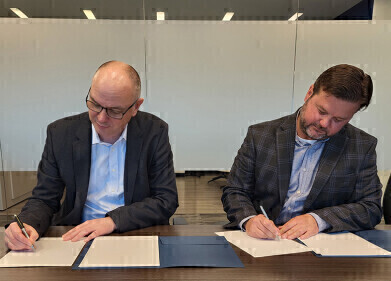Waste Management
Oil Spill Response Assists with Kuwait Spill
Jan 13 2011
Oil Spill Response (UK), has just completed a response to a fuel oil spill in the Arabian Gulf. The spill, which occurred in early August in Kuwait, was the result of a malfunction in part of a process system. A small quantity of fuel oil spilt into the surrounding environment.
Says Richard Sims, Regional Manager Middle East, “Although the spill was small our member decided that they needed additional assistance and so we initially provided them with the services of a Technical Advisor. An assigned Technical Advisor works alongside our member’s in-house team and essentially is there to help ease and improve decision making.
“Once we received the call I travelled from our base in Bahrain to Kuwait where I worked with our member’s in-house team to assess the spill area. Together we concluded that additional equipment was required. As an organisation we then worked to support the in-house team, we surveyed the surrounding beaches over a 10 day period, gave guidance and recommendations on response activity and mobilised the additional equipment from Bahrain.
“We had three Oil Spill Response personnel on-site including Ali Hussan who, as an Arab national and Arabic speaker, helped hugely with communications. Our team was integrated into our member’s team to bring the total response team to just over 50 people.”
In the four years that Oil Spill Response has had a base in Bahrain this is the first response incident of this nature that has required equipment to be mobilised from it. Adds Richard, “The equipment was transported across the Causeway, through Saudi Arabia and on into Kuwait.” Border crossings can, on occasion, be complicated but according to Richard despite differences encountered at different borders their equipment passed through smoothly. “As a global organisation we are experienced in border crossings. Different countries require equipment to be packed in different ways and documentation has to be correct but apart from differences in the time taken to cross different borders we experienced no problems at all.”
The response is now complete and a full internal investigation into how the spill occurred has commenced. Says Richard, “After any spill we reflect on what we did, how we did it and how well we responded. Our primary lesson learned from this response is that we can mobilise quickly and effectively from our Bahrain base and cross borders efficiently. We were also able to get additional support from both our UK and Singapore bases as we required it; so our global positioning worked really well.
“Other lessons learned were about adapting to some extreme working temperatures. For instance the temperature, at its peak, each day was around 510 C. We couldn’t work between the hours of 12noon and 4pm because of the heat so we worked around those times to ensure the safety of the team whilst still providing an effective response. Whilst we were responding to the spill it was also the holy month of Ramadan. As an organisation we are very culturally aware so again we ensured that we worked in such a way as to respect Ramadan, support the team – both in-house and from Oil Spill Response – whilst getting the job done.
“The final lesson learned, or should I say re-learned, is around security. Security remains a top priority for everyone at Oil Spill Response and with planning and support our equipment and team were safe and secure at all times during the response.”
Events
WEATHER • CLIMATE • WATER / EARTH OBSERVATIONS / GREEN ECONOMY
Oct 29 2024 St. Petersburg, Russia
Oct 30 2024 Hong Kong
Nov 05 2024 Toronto, Canada
Nov 06 2024 Ho Chi Minh City, Vietnam
Nov 12 2024 Valencia, Spain













